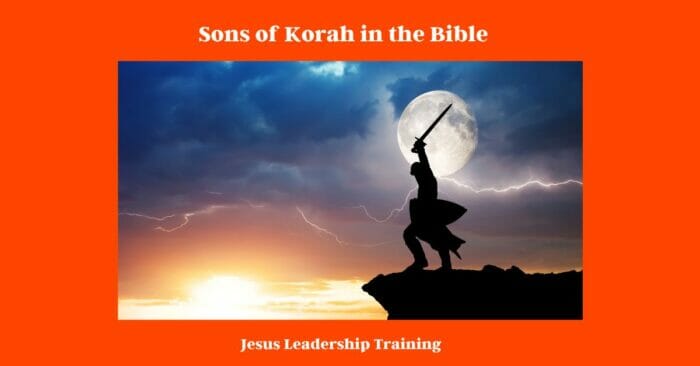Sons of Korah in the Bible – The name Korah is mentioned 32 Times in the Old Testament. The Korah mentioned in Numbers 16 Led a revolt against Moses and was killed. The sons of Korah were a group of Levites who lived during the time of Moses and the Israelites’ exodus from Egypt.
The sons of Korah were given the task of guarding the tabernacle and leading worship services. They are also mentioned in Psalms, where they are praised for their musical abilities. In this blog post, we will explore the story of the sons of Korah in the Bible, and learn more about their role in Jewish history.
Sons of Korah (Children of Korah) were Mentioned as performing:
- Levitical Duties
- Singers, Music Leaders
- Door Keepers of the Tent
- Bakers
- Korah in Numbers 16 – Led a rebellion against Moses and was consumed by Fire
Table of Contents
Sons of Korah in the Bible
The Sons of Korah were a group of Levites who were descended from the biblical figure Korah. Korah was a member of the tribe of Levi, (sons of Levi) and he had two sons, Assir and Elkanah. The Sons of Korah are mentioned several times in the Hebrew Bible, and they played an important role in the history of Israel.
The Sons of Korah were responsible for singing and playing music during religious ceremonies and festivals, and they also served as temple guards. In addition, the Sons of Korah were part of the team that built the tabernacle, and they were responsible for caring for the holy objects that were used in worship. The Sons of Korah are also mentioned in the New Testament, where they are commended for their faithful service to God.
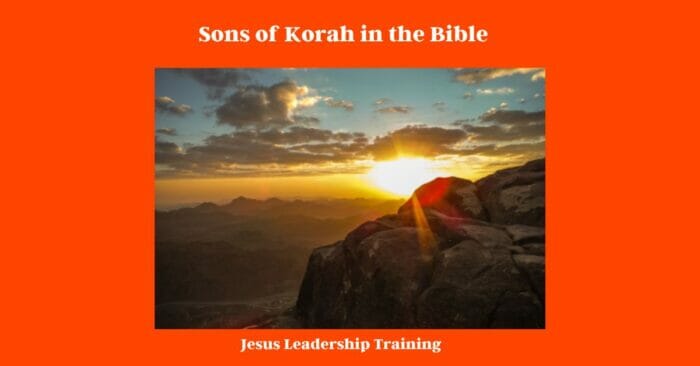
What Does Korah Mean in Hebrew
Korah is a Hebrew name that appears in the Bible. In Numbers 16, Korah leads a rebellion against Moses and Aaron. As punishment, Korah and his followers (the company of Korah) are swallowed up by the earth. The word “Korah” comes from the Hebrew root word קרה (qarah), which means “to be bald.” This is likely because baldness was seen as a sign of disgrace in ancient times.
In Jewish tradition, Korah is often associated with arrogance and rebellion. This is because he challenged the authority of Moses, who was chosen by God to lead the Israelites out of Egypt. As a result, Korah represents the dangers of rejecting authority and trying to take power for oneself.
The Sons of Korah were from the Levite Families
The Sons of Korah were one of the Levite families who were responsible for providing music for worship in the tabernacle. Korah was a Levite who rebelled against Moses, and as a result, he and his family were excluded from serving in the tabernacle. However, after Korah’s death, Korah’s sons repented their father’s rebellion and were allowed to once again serve in the tabernacle.
The Sons of Korah are best known for their musical contributions to the book of Psalms. Many of the Psalms that bear their name reflect their deep understanding of God’s justice and mercy. As we sing these Psalms, we can learn from the Sons of Korah about how to approach God with both praise and repentance.
Korah’s Sons: Expert Warriors with a Bow and Sling
When you think of great warriors in the Bible, who comes to mind? Perhaps Saul, David, or Gideon. But what about the sons of Korah? These men were noted as expert warriors (1 Chron 12:6), capable of using both a bow and sling. (In the time of David) we’ll take a closer look at the Sons of Korah and what made them such effective warriors.
The Sons of Korah were part of the tribe of Levi and served as temple musicians (1 Chron 9:19). Korah was a Levite who led a rebellion against Moses and Aaron (Num 16:1-40), but he and his followers were swallowed up by the earth before they could be put to death. As a result, only Korah’s descendants were allowed to serve as temple musicians. While the other tribes provided soldiers for Israel’s army, the Sons of Korah were not allowed to fight.
That changed when David became king. He recognized that the Sons of Korah were skilled warriors and decided to make them a part of his elite fighting force (1 Chron 12:6). The Sons of Korah quickly proved their worth, distinguishing themselves in battle on numerous occasions.
For example, they fought alongside David when he defeated the Philistines at Pasdammin (1 Chron 14:11-12) and again when he captured Jerusalem from the Jebusites (2 Sam 5:6-10).
So why were the Sons of Korah such effective warriors? Part of it had to do with their size and strength. The average Israelite warrior was about five feet tall; by comparison, Goliath was over six feet tall (1 Sam 17:4).
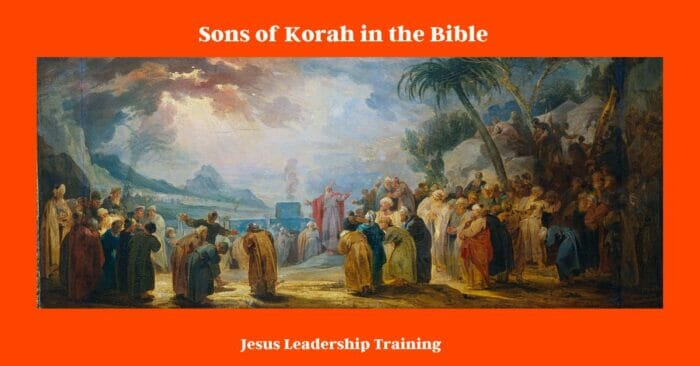
Bible (God) speaks of Korah Door Keepers
The Bible mentions Korah door keepers several times throughout the Old and New Testaments. In the Old Testament, we see that Korah was a Levite who was appointed by Moses to be a doorkeeper, keeper of the gates of the tabernacle, for the Tabernacle (Numbers 3:25-26). Later, when Joshua led the Israelites into the Promised Land, he too appointed doorkeepers (the door of their tents, for the Tabernacle (Joshua 6:23).
In 1 Chron 9:32 Sons of Korah were referred to as Bakers
The word “baker” in 1 Chron 9:32 comes from the Hebrew word מַצְהָל (matzahal), which can mean either “baker” or “confectioner.”
As bakers, the sons of Korah would have been in charge of making the bread for the sacrificial offerings. This was a very important job because the bread had to be perfect in order for it to be accepted by God. (To the Glory of the Lord)
The sons of Korah would have used flour, water, and salt to make their bread. They would have kneaded the dough and then baked it in an oven or on a hot stone.
What was the Tent of Moses / Tabernacle?
When most people think of the Bible, they tend to think of stories like Noah’s Ark, David and Goliath, or the birth of Jesus. However, there is so much more to the Bible than just stories. In fact, a large portion of the Bible is devoted to instructions on how God’s people are to live their lives.
One such instruction can be found in Exodus chapters 25-40, which detail the construction of the Tabernacle.
So, what exactly was the Tabernacle? The Tabernacle was a large tent that served as the dwelling place of God’s presence on Earth. It was built according to the precise specifications that were given by God to Moses.
The Tabernacle consisted of two main rooms: the Holy Place and the Most Holy Place. The Holy Place contained the seven-branched menorah (lampstand), the table of showbread, and the altar of incense. Only the priests were allowed to enter into the Holy Place.
The Most Holy Place was where the Ark of the Covenant resided. The Ark was a chest that contained the Ten Commandments, a pot of manna, and Aaron’s rod. Only the High Priest was allowed to enter into the Most Holy Place, and only on behalf of the people.
The rest of the Israelites were not allowed to enter either room because they would be struck dead if they attempted to do so. The Descendants of Korah led in successive generations.
Throughout history, there have been many attempts to understand and explain what exactly the Tabernacle was for. Some have argued that it was simply a physical representation of God’s heavenly dwelling place.
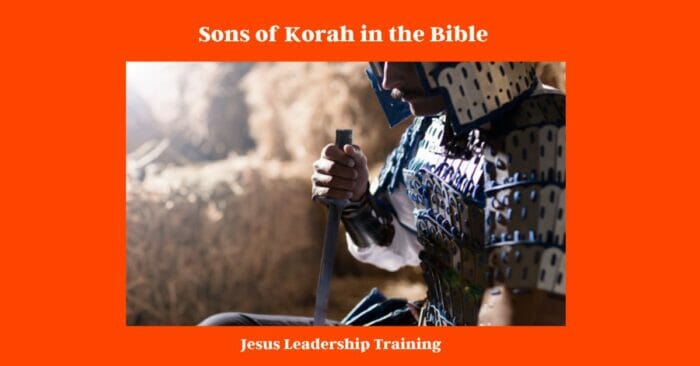
Others have argued that it served as a kind of “portal” between Heaven and Earth. However, I believe that its main purpose was to serve as a tangible reminder for God’s people that He is holy and must be treated as such.
The Tabernacle was a tangible reminder for God’s people that He is holy and must be treated as such. Its main purpose was not to serve as a physical representation of Heaven or a portal between Heaven and Earth but rather to remind us that God is holy and should be treated as such.
What Types of Music was used in the Tabernacle Worship?
The Tabernacle was the first place of worship for the children of Israel. It was a portable place of worship that could be moved as they traveled in the wilderness. There were various types of music that were used in Tabernacle worship. Some of the music was used for sacred occasions and some for secular occasions.
The music that was used in the Tabernacle worship was divided into two categories: sacred and secular. Sacred music was used for religious ceremonies and secular music was used for entertainment.
There were four types of instruments that were used in Tabernacle worship: wind, strings, percussion, and voices. Led By the Chief Musician is wher the Story of Korah is,
The wind instruments included the flute, horn, and trumpet. The string instruments included the lyre, harp, and lute. The percussion instruments included the cymbals and tambourines. The voices were either singing or chanting.
Vocal Music
The primary type of music used in tabernacle worship was vocal music. The Bible says that singing is “a joy to the Lord” (Psalm 100:2). Singing was to be an expression of joy and thanksgiving to God. The singers were to sing “psalms, hymns, and spiritual songs” (Ephesians 5:19).
These were songs that were specifically written for worship and contained words that would glorify God and edify the people. Noted items are called, psalms of the sons of Korah, songs like a deer pants for water. King David used the Sons of Kohath,Son of Korah, sons of Eliab, a son of Levi, Son of Izhar, a son of Kohath. They served the God of Israel in the work of the service. Their Soul pants for streams of water.
Instrumental Music
Instrumental music was also used in tabernacle worship. Instruments such as harps, lyres, tambourines, cymbals, and trumpets were played during the important worship service. The Bible says that instrumental music is “pleasing to the Lord” (Psalm 150:3-5). It is a way to make a joyful noise unto the Lord. The purpose of instrumental music in worship is to praise God and to lift up His name.
Dance
Dance was another form of physical musical expression that was used in tabernacle worship. The Bible says that David “danced before the Lord with all his might” (2 Samuel 6:14). Dance can be a very powerful expression of worship. It can be a way to express thanksgiving, joy, sorrow, or even repentance. When done correctly, it can be a beautiful and moving experience that draws people into the presence of God.
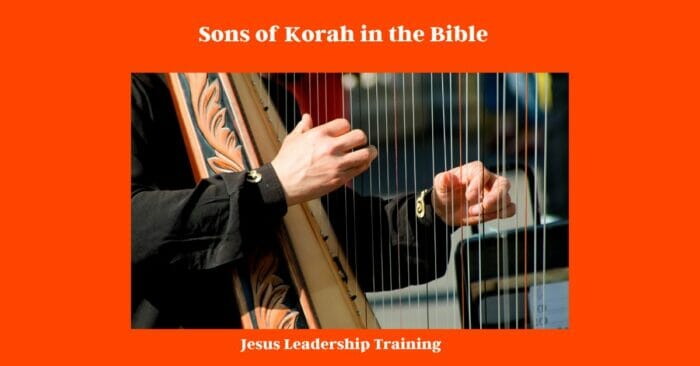
History of Music in Temple Worship? ( Psalms)
Singing and music have always played an important role in Christian worship. In the Old Testament, music was an integral part of public temple worship. The Israelites would sing hymns of praise to God and offer sacrifices of thanksgiving. Music was also used as a tool for instruction, helping people to remember the laws and teachings of God.
The role of music in worship continued into the New Testament era. In the book of Acts, we see that singing was a regular part of Christian worship (Acts 16:25). Paul even instructs Christians to sing “psalms and hymns and spiritual songs” to one another as a way of teaching sound doctrine (Colossians 3:16).
Music has always been an important part of Christian worship because it helps us to express our praise and thanksgiving to God. It also enables us to teach sound doctrine to one another. As we sing, we proclaim the truths of the gospel and remind each other of who we are in Christ.
So, next time you’re singing along with your favorite worship song, remember that you are taking part in a long tradition of using music to glorify God and edify his people. As you sing your praises to God, you are joining with Christians throughout history who have used music as a way to express their love for him.
Sons of Korah Bible: An Inspiring Tale of Redemption and Service
The story of the Sons of Korah in the Bible is a heartening one that carries messages of forgiveness, redemption, and transformation. This article aims to unfold their narrative while giving you practical steps to bring about positive changes in your life.
Who are the Sons of Korah in the Bible?
The Sons of Korah were descendants of Levi and lived during the time of Moses. Their forefather, Korah, was a man who led a rebellion against Moses and Aaron and faced dire consequences as a result. The ground literally swallowed him and his supporters. However, his sons were spared. Instead of carrying on their father’s legacy of dissent, they became musicians and gatekeepers in the temple, serving God with loyalty.
Did the Sons of Korah write Psalm 84?
Yes, the Sons of Korah are attributed to composing several Psalms, including the beautiful Psalm 84. This Psalm is an eloquent expression of longing for God’s presence and the joy found in worship. It reflects a heart wholly devoted to spiritual matters, which is a remarkable turnaround from their father Korah’s rebelliousness. This Psalm serves as an excellent example of how one can redirect the course of their family history by making choices that honor God.
What Did the Sons of Korah do in the Temple?
The Sons of Korah served in various capacities in the Temple. They were singers, musicians, and even gatekeepers. Their responsibilities included ensuring the safekeeping and cleanliness of the temple. They played a crucial role in maintaining the sanctity of the holy place and took their duties seriously. Their faithfulness in their service to God stands as a beacon of hope for anyone seeking to turn their life around for the better.
What is Korah in the Bible?
Korah is a complex character in the Bible. He was a Levite who was unsatisfied with his role and rebelled against Moses and Aaron. His discontentment led him to lead a group of men in opposition, which resulted in his tragic end. Yet, his story is also a stepping stone for his sons who chose a path of righteousness, serving as a poignant reminder that one’s background does not have to determine one’s destiny.
What Happened to the Sons of Korah in the Bible?
The Sons of Korah survived the calamitous event that took their father. They chose to serve God in the temple rather than continue in their father’s misguided steps. Their legacy lives on in the Psalms they wrote, which continue to inspire and uplift believers today.
Sons of Korah Bible Verse
A prominent Sons of Korah Bible verse is Psalm 42:1, which states, “As the deer pants for streams of water, so my soul pants for you, my God.” This verse encapsulates their spiritual journey from a past marred by rebellion to a future anchored in devotion.
When Did the Sons of Korah Write Their Psalms?
It’s believed that the Sons of Korah wrote their Psalms during the reigns of King David and King Solomon. These Psalms were not only prayers but also served as communal songs, highlighting their significant role in the worship life of ancient Israel.
Duties of The Sons of Korah
As already discussed, the Sons of Korah had multiple duties in the temple. They were gatekeepers, musicians, and part of the choir that led worship. Their multifaceted roles make them fascinating figures in biblical history, illustrating how anyone, regardless of their past, can contribute to community and spiritual life.
Sons of Korah in Bible
The Sons of Korah are mentioned in the Bible, primarily in the Old Testament. They are renowned for their role as Temple musicians and gatekeepers, and they were responsible for some of the Psalms. Here are three major takeaways:
1. Role in Temple Worship:
The Sons of Korah played a crucial role in the worship activities of the temple. They were musicians, singers, and gatekeepers who were involved in organizing and leading worship in the Temple of Solomon. Their involvement underscored the importance of music and singing in worship, demonstrating that worship is a multifaceted activity involving various arts to glorify God.
2. Authors of Psalms:
Several Psalms in the Book of Psalms are attributed to the Sons of Korah. These include Psalms 42, 44-49, 84, 85, 87, and 88. The psalms they wrote are diverse, covering themes of longing for God, the majesty of God, the joy found in worship, and deep lament. The content of these Psalms underscores the theological depth and the range of human experiences and emotions expressed in the biblical text, offering insights into the relationship between humanity and the divine.
3. Grace and Redemption:
The story of the Sons of Korah is also a powerful narrative of grace and redemption. Korah, the ancestor of the Sons of Korah, led a rebellion against Moses and Aaron and faced divine judgment. However, the descendants of Korah were spared and were subsequently integrated into the religious life of Israel. This underscores the Biblical theme of God’s grace and redemption, showing that the sins of the fathers do not permanently condemn the children, and that restoration and redemption are possible.
These three points emphasize the multidimensional roles of the Sons of Korah in the religious life of ancient Israel, their contribution to the theological and literary richness of the Psalms, and the enduring biblical themes of grace, redemption, and worship they exemplify.
Final Thoughts
As we look back at the story of the Sons of Korah in the Bible, here are seven Positive Action Steps that we can take away:
- Learn from the Past: The Sons of Korah did not let their father’s mistakes define them. We too can break free from past errors or a troubling family history.
- Be Open to Transformation: They chose a different path and found their purpose, showing that it’s never too late to change.
- Prioritize Spiritual Growth: Just as the Sons of Korah did by writing Psalms like Psalm 42 and 84, we should prioritize our spiritual health.
- Serve Your Community: Whether in small or big ways, we can contribute to our communities and create a legacy of positive impact.
- Embrace Forgiveness: If the Sons of Korah could move past the tragedy and shame brought on by their father, so can we.
- Practice Gratitude: Being thankful for second chances can fuel a life of fulfillment and happiness.
- Take Responsibility: Like the Sons of Korah, taking responsibility for our actions leads to growth and a meaningful life.
FAQs
Why are the Sons of Korah significant?
- The Sons of Korah are significant because they turned a difficult family history into a legacy of worship and service to God.
How did the Sons of Korah serve in the temple?
- They served as musicians, singers, and gatekeepers, playing a crucial role in maintaining the sanctity of the temple.
What is the message behind the Sons of Korah’s story?
- Their story conveys the power of forgiveness, transformation, and the ability to change one’s life for the better.
Are there Psalms written by the Sons of Korah?
- Yes, they wrote several Psalms, including Psalm 42 and Psalm 84, which are cherished for their depth and beauty.
Did the Sons of Korah have other roles besides serving in the temple?
- Their primary roles were in the temple, but they were also known for their compositions that enriched the worship life of Israel.
What happened to Korah, the father of the Sons of Korah?
- Korah led a rebellion against Moses and Aaron, resulting in a tragic end where the earth swallowed him and his followers.
The story of the Sons of Korah in the Bible is one of hope, forgiveness, and transformative power. It shows us that our past doesn’t have to define us and that, through conscious choice and divine grace, we can build a life filled with purpose and joy. Let’s take a leaf from their book and aim to be better, do better, and live better.
Sons of Korah in the Bible
The sons of Korah in the Bible have a story that packs a powerful punch, particularly when it comes to the themes of forgiveness, redemption, and personal transformation. These men went from being associated with rebellion to becoming key figures in the religious traditions of ancient Israel. Isn’t it amazing how life offers second chances?
Who Were the Sons of Korah Who Wrote Psalms
The sons of Korah were descendants of Levi and part of a family that played a significant role in the Temple services. They were particularly known for their role as gatekeepers and musicians in the Temple of Jerusalem. Even more notably, they authored several Psalms, including Psalms 42, 44-49, 84, 85, 87, and 88.
At first glance, the story of the sons of Korah might seem like a tale of doom because their ancestor, Korah, led a rebellion against Moses and Aaron. But here’s the plot twist: The sons of Korah didn’t suffer the fate of their rebellious ancestor. Instead, they chose a different path and were spared from God’s judgment, giving us a potent example of how it’s possible to break away from negative family cycles and create a new legacy.
What Happened to the Sons of Korah in the Bible
The Biblical narrative tells us that Korah led a revolt against Moses and was swallowed up by the earth as a result. However, the sons of Korah survived. Why? According to the Bible, they distanced themselves from their father’s destructive path and chose obedience over rebellion.
Not only did they survive, but they also became a crucial part of the religious and cultural life of Israel. They were involved in the most sacred duties, such as maintaining the Temple and composing Psalms that are still cherished today. So, the sons of Korah offer us a lesson in redemption and show that we are not doomed to repeat the mistakes of our ancestors.
Who Are the Sons of Korah in Psalm 46
In Psalm 46, the sons of Korah penned one of the most reassuring pieces of scripture. The Psalm starts with the line “God is our refuge and strength, an ever-present help in trouble.” If you think about it, these men, who descended from a family known for a massive act of disobedience, chose to celebrate God’s enduring grace and protection. What a turn-around!
Why Did the Sons of Korah Write Psalm 46
The sons of Korah wrote Psalm 46 to serve as a source of hope and comfort during times of difficulty. When we find ourselves trapped in challenging circumstances, the Psalm reminds us that God is a steadfast refuge. It teaches us that when life throws curveballs, we should turn to our faith as our ultimate source of strength. Given the tragic history of their family, this message takes on an extra layer of profundity.
Who Are the Sons of Korah in Psalm 84
In Psalm 84, the sons of Korah express deep reverence and love for God’s dwelling place. The authors convey a sense of joy and awe when thinking about the Temple and yearning to be close to God. This is another example of how these men were able to break the cycle of rebellion and find peace through devotion.
When Did the Sons of Korah Write Their Psalms
The exact timing for when the sons of Korah wrote their Psalms is unclear. Most scholars agree that these Psalms were likely composed during the period of the First Temple (957-586 BCE). What’s important is that their messages have stood the test of time, continuing to be relevant for people today.
Who Are the Sons of Korah in Psalm 42
Psalm 42 is another heartfelt song attributed to the sons of Korah. In it, they express a profound sense of longing for God, comparing it to a deer panting for water. This Psalm speaks to those moments in life when we feel spiritually parched and are searching for renewal. It’s a powerful reminder that seeking closeness with God can fulfill the deepest yearnings of our souls.
Sons of Korah Bible Verse
While there are several Bible verses mentioning the sons of Korah, one that stands out is Numbers 26:11, which says, “The sons of Korah, however, did not die.” This verse is significant because it underscores the theme of redemption and forgiveness that runs through their story.
Final Thoughts
7 Positive Action Steps Inspired by the Sons of Korah
- Acknowledge Past Mistakes: The first step in any transformation journey is acknowledging where you’ve gone wrong.
- Seek Forgiveness: Whether it’s from God, others, or yourself, seeking forgiveness is crucial for emotional and spiritual healing.
- Break the Cycle: Don’t feel trapped by your past or your family history. Take proactive steps to break negative cycles.
- Find Community: Just as the sons of Korah found a role in the temple services, find a community where you can contribute and grow.
- Embrace Your Talents: The sons of Korah used their musical talents for a higher purpose. Embrace your skills and use them positively.
- Turn to Faith: In times of trouble or uncertainty, let your faith guide you, as seen in Psalm 46.
- Seek Spiritual Fulfillment: Lastly, never stop seeking a deeper relationship with God or a higher power.
Sons of Korah in the Bible
The sons of Korah were a group of Levites who were responsible for the music in the Tabernacle. The music they played was divided into two amazing categories: sacred and secular. Sacred music was used for religious ceremonies and secular music was used for entertainment.
They were warriors as well as musicians and played an important role in the history of Israel. The sons of Korah were also responsible for writing some of the Psalms.
So you’re interested in the Sons of Korah from the Bible? They’re a fascinating bunch with a lot of significant contributions to biblical literature and history. Here’s a table that’ll give you the 411 on them!
| Fact Category | Information | Reference(s) |
|---|---|---|
| Who They Were | Descendants of Korah, a Levite who led a rebellion against Moses and Aaron and subsequently faced divine judgment. | Numbers 16 |
| Their Role | They served as gatekeepers and musicians in the Temple of Jerusalem. | 1 Chronicles 9:19; 26:1-19 |
| Psalms Attributed | At least 11 Psalms are attributed to them, including Psalm 42, 44–49, 84, 85, 87, and 88. | Book of Psalms |
| Notable Songs | They’re known for songs that deeply express human emotions and experiences, from longing for God to questioning His seeming absence. | Psalm 42, 44, 84 |
| Survival | Unlike their ancestor Korah, they were not involved in the rebellion and were thus spared. Their line continued to serve faithfully. | Numbers 26:11 |
| Duties | Besides musical responsibilities, they also had other roles like guarding the sacred bread and sanctuary. | 1 Chronicles 9:19 |
| Lineage | The Prophet Samuel was also a descendant of Korah, making the Sons of Korah related to one of the most important prophets in Israel’s history. | 1 Chronicles 6:22-38 |
There you go! The Sons of Korah might have descended from a rebellious ancestor, but they more than redeemed their family’s name through their faithful service and stunning contributions to the Psalms. They’re a testament to the idea that your past doesn’t have to dictate your future. Cool, right? 😊📖
God Bless Greg




